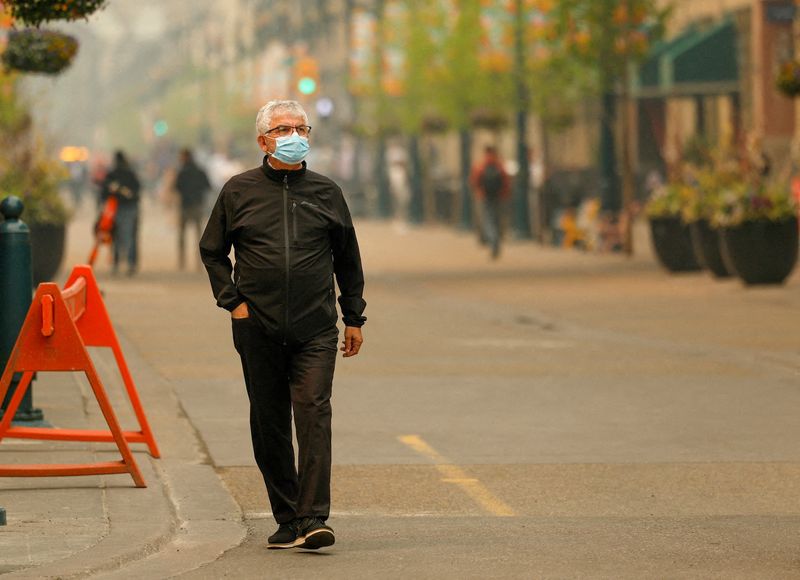By Anna Mehler Paperny and Kyaw Soe Oo
TORONTO (Reuters) - Just when it seemed safe to unmask, some Canadians are donning the face coverings made ubiquitous during the coronavirus pandemic as a protection against hazardous smoky conditions as wildfires ravage much of the country.
Canada is seeing its worst-ever start to wildfire season as blazes burn from the western provinces to Atlantic Canada. Smoke from wildfires in Quebec has settled over southern Ontario and travelled into the United States, disrupting flights and sending people indoors.
Some mask companies that sold protective equipment during the pandemic have turned to wildfire marketing. On Wednesday mask supplier United Canada sent out an email with "Wildfire Season Safety Tips" that included an N95 mask. Canada Strong sent out an email Tuesday titled "Ontario Smoke will be Intense - Helpful Tips."
Neither responded Thursday when asked whether they have seen an uptick in mask interest.
Rivi Hume-Beardall could feel the difference when she stepped outside.
"It kind of hurts and just the minute I stepped outside, it was a little harder to breathe. So I just put a mask on."
The 18-year-old Toronto resident has asthma, and "I don't want my lungs to get damaged at all," she told Reuters Thursday.
It's "a little disheartening" to be wearing a mask again, she said, but "that's what you have to do. ... I don't want to regret not wearing one."
Hume-Beardall added she hopes the spectre of smoky air "is a little bit of a wakeup call to people around the environment."
The concern with this smoky air is particulate matter that is 2.5 microns or less in diameter - small enough to get inside not only the lungs but the bloodstream, said Samantha Green, a family doctor with Unity Health in Toronto.
Studies in people have linked wildfire smoke with higher rates of heart attacks, strokes, and cardiac arrests, increases in emergency room visits for respiratory conditions, and weakened immune defenses. Wildfires have also been linked with eye irritation and skin problems.
When the air quality health index is above 7, "then everyone who is spending time outdoors should be wearing" a mask, Green said, adding that protections are needed for people who are more exposed to air pollutants because they work outdoors or are homeless.

"We know things are worsening and we need to be better prepared on a systems level," she added.
Marietta Haberer, 77, started wearing an N95 left over from her pandemic supply on Wednesday. The campfire smell in the air "is fine if you're camping," she said.
